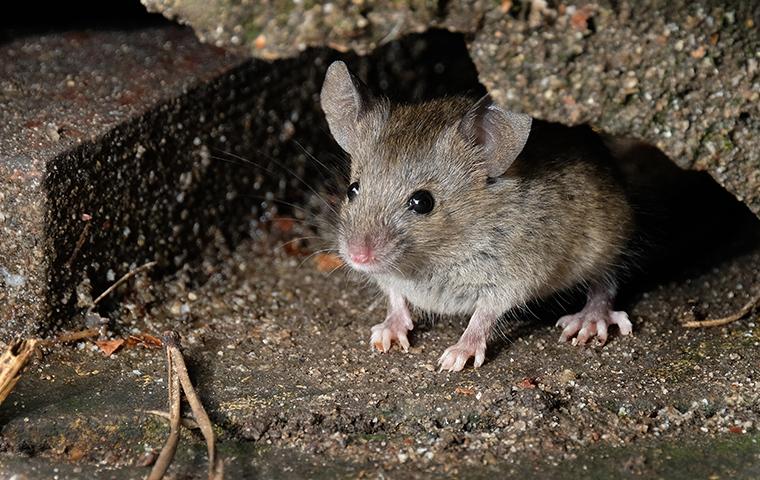What are rodents?
Mice and rats are examples of rodents. They are mammals and often referred to as commensal, meaning they want to “share our table.” They have learned to live successfully with people getting all their basic food, water, and shelter needs from us.
Mice are one of the most common rodent pests inside homes and businesses. Mice are found in rural areas and throughout many neighborhoods and city areas. Fitting through holes the size of a dime and their ability to vertically climb most surfaces make these pests difficult to control. They also reproduce rapidly, leading to large attic infestations; this is an increasingly common problem in Dallas, Plano, Allen, Frisco, and McKinney due to the rapid land development and property growth.

Two of the most common rats found on Texas properties are the roof rat and Norway rat. Rats eat seeds, grains, fruit, and garbage, which are all things found around most of our properties. Rats invade homes, usually in the winter and spring, searching for warm shelter and safe nesting sites to have their young. Roof rats are accomplished climbers, can vertically climb most rough surfaced walls, and are usually found nesting high up off the ground in places like attics. Norway rats invade at ground level and tend to live in basement areas and crawlspaces, because they have heavy bodies and are poor climbers.
Are rodents dangerous?
Having mice or rats living inside your home can have dangerous and devastating effects. Rats and mice can not only make a mess in your home or attic, but they cause property damage. Rodents tend to chew on wires and leave droppings, urine, and odors in attics and crawlspaces. Attic insulation, HVAC systems, and your personal belongings are all at risk when there is a rodent infestation in your home.
The presence of rodents in your house can also present a variety of health problems. The contamination of food and transmission of diseases are the primary concern. Rodents also carry numerous diseases and parasites that can infect humans and family pets.
Some of the diseases and parasites rodents transmit include:
- Salmonella
- Hantavirus
- Leptospirosis
- Eosinophilic meningitis
- Fleas and ticks
Why do I have a rodent problem?
The most common reason rats and mice have moved into your Texas home is that it provides them with a warm, dry place to live and nest. In the middle of winter, when the weather is coolest or during periods of heavy rain, rodents move to where they can be more comfortable.
Rodents also move to our properties in search of food. These critters have a high metabolism and need a constant source of food to satisfy their hunger. As omnivores, rodents feed on many of the same foods we do, making our homes and yards very attractive to them. Rodents will forage for food outside in our trash cans, gardens, bird feeders, and outdoor eating areas; inside, they infiltrate our kitchen and pantry areas.
Eliminating rodents from your property as quickly as possible is essential. Rodents breed year-round; they do not hibernate. A female rat can have 12 babies up to eight times a year, and in less than two months, those “babies” can begin reproducing. In just one year, a pair of rats can lead to 10,000-15,000 offspring!
Where will I find rodents?
Outside, rodents live and nest in various places, usually choosing dark, secluded spots to keep themselves hidden away from hungry predators. Piles of garbage, woodpiles, gardens, vines, and areas next to or under a foundation or concrete slab are favorite hideouts. Roof rats also like to nest up off of the ground in trees.
When rodents move into a building, they do their best to stay hidden. During the winter months, rodents like to nest in areas that provide warmth, like wall voids near hot water pipes, heaters, and behind large kitchen appliances like refrigerators or stoves. Some of their other favorite indoor hideouts and nesting spots include cardboard boxes, upholstered furniture, and cluttered closets.
Since rodents are nocturnal, these unwanted houseguests may go noticed when an infestation is in its infancy, but as the infestation grows, the signs of their presence become obvious:
- Chewed wires and electrical shorts
- Holes chewed in the exterior of boxes and other food containers
- Gnaw marks on wooden furniture, trim, or cabinets
- Scratching noises in the ceiling
- Droppings in cabinets or around the pantry
- Urine trails
- Grease or dirt marks along the edges of furniture or on walls
- A strong, musty odor near nesting sites
If you notice even any signs of rodents in your home, contact us at Brinker Animal Removal! We are proud to offer natural rat and rodent control void of pesticides and poisons that can be dangerous to the building occupants.
How do I get rid of rodents?
We know the best way to stop problems with rodents is to prevent them from getting inside your structure in the first place. We work closely with home and business owners to provide a permanent solution to rodent problems. Our knowledge, experience, and dedication will ensure that rodents are removed from your property and won’t be able to return!
To eliminate rodents, we simultaneously remove the rodents while covering up all entry points with ultra-durable metal products. With an eco-friendly, anti-microbial formula, we erase all pheromone trails left by rodents and kill diseases. Our professional will then work with property owners to identify problem areas to prevent future rodent access.
To learn about our rodent control solutions, such as our Three Step Rat Removal Process – which includes the trapping of rats and other rodents – rat and rodent exclusion, and attic treatment and restoration, reach out to Brinker Animal Removal today!
How can I prevent rodents in the future?
While you should always allow a professional to handle issues with rodents, there are things you can do around your property to make it less attractive to these destructive and damaging pests:
- Rodents can squeeze into structures through the tiniest openings. Keep them out by sealing any small crack or gap you discover in your home’s exterior.
- When repairing defects in your home’s exterior, use a strong material like steel wool that rodents can’t chew through.
- Remove things from your yard that rodents can hide in like woodpiles, construction debris, brush, and dense shrubbery.
- Remove vines from your home’s exterior.
- Keep lids on trash cans, pick up uneaten pet food, and regularly harvest gardens and fruit trees to prevent food odors from attracting rodents to your property.
- Remove wild animal or bird feeders from your property.
- Store animal feed in hard-sided containers with tight-fitting lids.
Learn about our residential animal removal and commercial wildlife services.
Request Your Free Inspection
Complete the form below to schedule your no obligation inspection.
